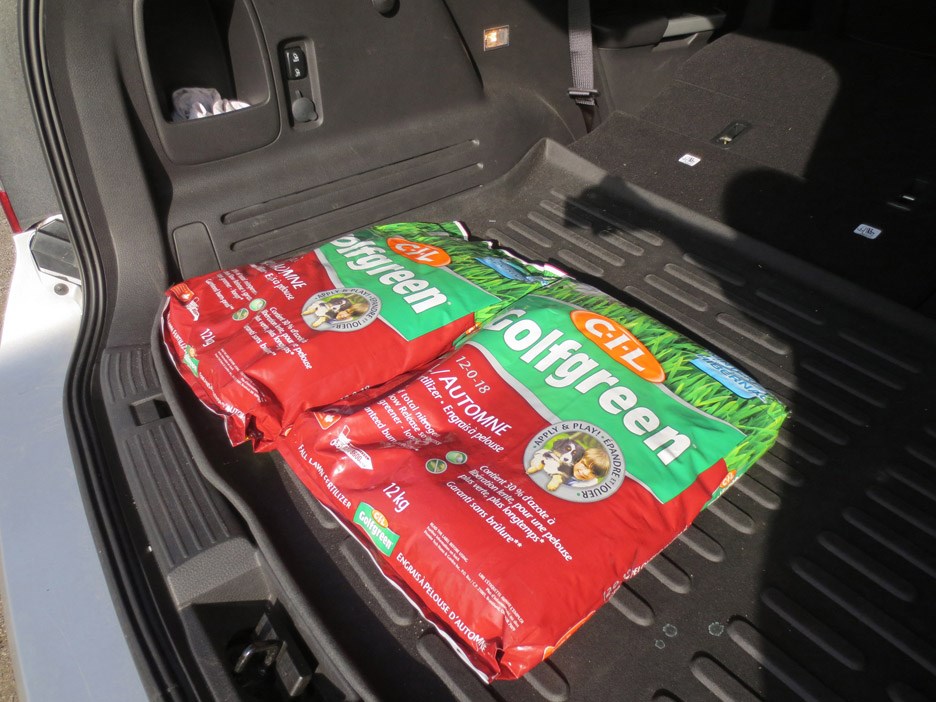Time to get serious about protecting your garden investment. This is like making a deposit in your RRSP - do it now and reap the rewards later.
Put a wrap on your garden in November and you end up with a great looking garden come spring. Let us explain:
Lawn Fertilizer. The most important application of the year is right now. When you apply a slow release nitrogen, high potash formula like 12-0-18 to your lawn now, you beef up the root zone of the grass plants for better performance next spring. There are no short-term benefits in this. Your lawn won’t spring to life and give you great joy this fall. Instead, your lawn will be much less susceptible to snow mould, mildew and, more to the point, it will bounce back with vigor come spring.
Clean the cutting deck of your lawn mower, spray oil on it and disconnect the spark plug. Add stabilizer in the gas tank or empty it.
Perennials.No winterizing necessary. But this is your last chance to dig and divide all mature perennials and move the divisions around your garden. Or give them away.
Fruit trees.The deeper the snow, the more susceptible young fruit trees and crabapple trees are to rabbit and mice damage. Put a plastic, spiral collar on each tree until it is about five years old or has matured to about six centimetres in diameter measured from 20 cm above ground. A mature fruit tree has tough bark that does not interest hungry rodents.
Cedars, upright junipers and Yew hedges. Wrap in a layer of burlap to prevent wind damage from top to bottom. Secure with garden twine. Wrap a second layer of burlap to prevent sun damage, which usually occurs in late winter/early spring when the sun reflects off the snow. Mark did not wrap a new yew hedge last winter and he had to look at burnt foliage all season. We learn from our mistakes (and laziness).
Mound roses.Many roses benefit from mounding soil about 60 cm up the main canes of the plant this time of year. Fresh triple mix or garden soil insulates the green canes from the freeze/thaw cycles of the winter which can wreak havoc on hybrid teas, floribundas, grandifloras and miniature roses. Shrub roses and some of the new Pavement roses are winter hardy and do not need coddling.
Water Deeply.Wet roots are well-winterized. The extremely dry winter air sucks moisture from more than your lips. It can dehydrate the root zone of your garden plants, especially those located under the protection of your roof soffit and eave. Let your garden hose drip water around each plant until you are certain that the root zone is well hydrated. Turn off your outdoor faucets from the indoor control.
Containers.Empty containers of existing soil by adding it to your garden. If you live in an apartment or condo, give the soil to a friend who has a garden. It is good stuff, just not good enough to use again next year in a container. Replace with quality container mix in the spring. In the mean time, turn each pot up side down to avoid cracking in the cold winter or find an enclosed place to store them.
Leaves.We don’t rake leaves into craft paper bags and put them out to the curb for the city to take away anymore. Now, we rake leaves onto our garden and let the worms take them down into the subsoil where they are converted into nitrogen-rich earth worm castings. If you have a lot of leaves, run your lawn mower over them at its’ highest setting and rake excess mulched leaves onto the garden. If you have a big garden, steal the leaves that your old-fashioned neighbours put out for the municipality to pick up. They will never notice and if they do, they won’t care.
Bring in your garden hose and any garden statuary and bird baths that might risk cracking in the frost.
Done.
Mark Cullen is an expert gardener, author, broadcaster, tree advocate and Member of the Order of Canada. His son Ben is a fourth-generation urban gardener and graduate of University of Guelph and Dalhousie University in Halifax. Follow them at markcullen.com, @markcullengardening, on Facebook and bi-weekly on Global TV’s National Morning Show.



